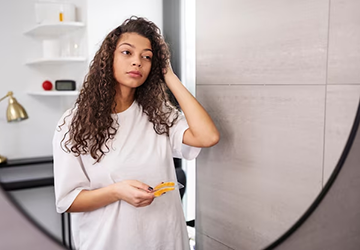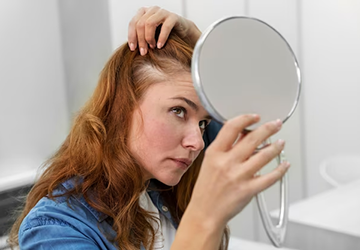life style
Hair loss is a common concern that affects many people at various stages of their lives. The causes of hair loss can vary, from genetic factors to lifestyle choices. One of the primary causes is androgenetic alopecia, commonly known as male or female pattern baldness, which is linked to genetic predisposition. Hormonal changes, particularly those associated with pregnancy, menopause, and thyroid problems, can also lead to hair loss. Other factors include medical conditions like alopecia areata, scalp infections, and trichotillomania (hair-pulling disorder). Environmental factors, such as stress, poor nutrition, and exposure to harsh chemical treatments or styling products, can also contribute to hair thinning and loss.

Comprehensive Strategies on How to Prevent Hair Loss
Focusing on internal and external factors is essential when considering how to prevent hair loss. Regular exercise and stress management techniques, like yoga and meditation, can also be beneficial. Proper hair care is crucial; this includes using gentle hair products, avoiding harsh chemical treatments, and minimizing heat styling. Regular scalp massages stimulate blood.
A Step-by-Step Hair Loss Treatment Guide
Creating a practical hair loss treatment guide involves a multi-faceted approach. The first step is to consult a healthcare professional or a dermatologist to identify the underlying cause of hair loss. They may recommend specific treatments like minoxidil (Rogaine), widely used for pattern baldness or finasteride for men. In cases of nutrient deficiencies, supplements or dietary changes may be advised. For stress-related hair loss, therapy or counselling can be effective. Recent advancements in treatments like platelet-rich plasma (PRP) therapy and low-level laser therapy have shown promising results in stimulating hair growth.
Natural Remedies and Lifestyle Changes for Hair Loss Prevention
In addition to medical treatments, natural remedies and lifestyle changes can be part of preventing hair loss. Natural oils such as rosemary oil, peppermint oil, and castor oil have been linked to promoting hair growth. Herbal supplements like saw palmetto and biotin are also famous for hair health. It's essential to ensure that these natural remedies are used in conjunction with, and not as replacements for, medical treatments, especially in cases of severe hair loss.
Understanding and Addressing Psychological Impacts of Hair Loss
Hair loss can have a significant psychological impact, affecting self-esteem and emotional well-being. A practical hair loss treatment guide should address these psychological aspects. Support groups, counselling, and focusing on other aspects of personal appearance can help cope with hair loss. Building a support network and discussing feelings with friends, family, or professionals can provide emotional relief and a positive outlook during treatment.
Exploring Less Common Causes of Hair Loss
When investigating the causes of hair loss, it's essential to consider some lesser-known factors that might contribute to this condition. Environmental pollutants and exposure to heavy metals can sometimes play a role in hair thinning. Chronic illnesses such as autoimmune diseases and prolonged medication use can also lead to hair loss. Over-styling and excessive use of hair products, including dyes and relaxers, can weaken hair follicles, leading to hair loss over time. Understanding these less common causes is crucial in formulating a comprehensive hair loss prevention and treatment approach.

Advanced Hair Loss Treatment Guide: Cutting-Edge Therapies
In hair loss treatment guides, cutting-edge therapies are emerging as promising solutions. One such treatment is stem cell therapy, which involves regenerating hair follicles through stem cells. Another innovative approach is gene therapy, which aims to treat genetic causes of hair loss by correcting defective genes. While these treatments are still experimental, they represent the potential for groundbreaking advancements in combating hair loss.
Nutritional Aspect: The Role of Diet in Hair Health
An often-overlooked aspect of preventing hair loss is the role of diet and nutrition. A diet lacking in essential nutrients can lead to hair thinning and loss. Incorporating foods high in omega-3 fatty acids, such as fish and flaxseeds, can improve scalp health. Protein-rich foods like eggs and lean meats are vital for hair growth, as hair follicles are mostly made of protein. Iron-rich foods like spinach and legumes can also combat hair loss associated with anaemia.
Psychological and Emotional Support for Hair Loss Sufferers
Addressing the emotional and psychological aspects is a critical component of a practical hair loss treatment guide. Hair loss can significantly impact one's self-esteem and emotional well-being. Seeking support from counsellors or therapists specializing in body image issues can be beneficial. Online forums and support groups can also provide a platform for individuals to share their experiences and coping strategies, offering comfort and understanding.
The Future of Hair Loss Treatments: Research and Development
Looking ahead, the future of hair loss treatment is promising, with ongoing research and development in this field. Scientists continuously explore new pathways and mechanisms involved in hair growth and loss to develop more effective and personalized treatment options.
Quick FAQs
1. Can stress lead to permanent hair loss?
Answer: While stress can cause temporary hair loss, known as telogen effluvium, it's usually not permanent. Once the stressor is managed or removed, hair typically begins to regrow. However, prolonged stress can lead to chronic hair shedding. Managing stress through relaxation techniques and lifestyle changes can reverse stress-related hair loss.
2. Are natural oils effective in treating hair loss?
Answer: Natural oils like rosemary oil, peppermint oil, and castor oil can be beneficial in promoting hair growth and reducing hair loss. These oils stimulate the scalp and can increase blood flow to hair follicles. However, they should be used as part of a comprehensive hair care routine and not as standalone treatments for hair loss.
3. Is it possible to reverse hair thinning caused by nutritional deficiencies?
Answer: Hair thinning caused by nutritional deficiencies can often be reversed by correcting the deficiency. A diet rich in essential nutrients like iron, protein, vitamins A, C, and E, and omega-3 fatty acids is crucial for hair health. In some cases, supplements may be necessary to address specific deficiencies. Consultation with a healthcare provider is recommended to determine the appropriate course of action.

